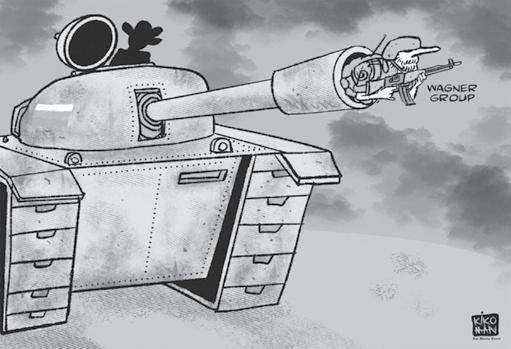
3 minute read
Progress delayed is progress denied
the first phase of the PUV modernization program. The extension takes effect from June 30 and expires on Dec. 31, 2023.
ON the back of the nationwide strike planned by transport groups, the Land Transportation and Franchising Regulatory Board (LTFRB) announced that it would extend, yet again, the deadline for PUV operators to comply with
Advertisement
It will be recalled that the PUV modernization program was championed by former DOTr secretary Art Tugade. Ratified in 2017, jeepney and bus operators were given three years, or until 2020, to comply with the first phase of the program. This first phase requires PUV operators to consolidate into cooperatives or corporations to achieve economies of scale – doing so will enable them to professionalize their operations.
The year 2020 came and went and the greater majority of jeepney and bus operators failed to comply. Transport groups asked for an extension and threatened to mount a nationwide strike if they did not get their way. The LTFRB relented and granted an extension until June 20, 2023, or another three years.
As the new deadline approaches, many jeepney and bus operators are caught flatfooted again, not having consolidated. With their franchises in threat of nonrenewal, another transport strike was organized to pressure the LTFRB. It is the proverbial gun that they put to the public’s head. Again, LTFRB relented and extended the deadline to Dec. 31, 2023.
The LTFRB should show some backbone. If they cave every time transport groups threaten a strike, this PUV modernization program will never come to fruition.
The PUV modernization program will make the country’s public transport system more efficient and environmentally friendly. The program calls for the phaseout of jeepneys, buses and other public utility vehicles that are 15 years old or older.
These will be replaced by safer, more comfortable and environmentally-friendly alternatives over the next three years. Currently, there are 220,000 jeepney units operating throughout the country.
The replacement vehicles are required to utilize Euro-4 compliant or electric engines to comply with the Clean Air Act. PUVs must also be rigged with CCTV cameras,
The views expressed by our Op-Ed contributors are solely their own and do not necessarily reflect the predilection of the editorial board and staff
Advertising And Advertorial Policies
publication by client. (“Client’s Material”)
Submission of an advertisement or advertorial to an AJPI sales representative does not constitute a commitment by AJPI to publish a Client’s Material. AJPI has the option to correctly classify any Client’s Material and to delete objectionable words or phrases.
Client represents and warrants that a Client’s Material does not and will not contain any language or material which is libelous, slanderous or defamatory or invades any rights of privacy or publicity; does not and will not violate or infringe upon, or give rise to any adverse claim with respect to any common law or other right whatsoever (including, without limitation, any copyright, trademark, service mark or contract right) of any person or entity, or violate any other applicable law; and is not the subject of any litigation or claim that might give rise to any litigation.
Publication of a Client’s Material does not constitute an a greement to continue publication.
Client agrees and covenants to indemnify AJPI and its officers against any and all loss, liability, damage, expenses, cost, charges, claims, actions, causes of action, recoveries, judgments, penalties, including outside attorneys’ fees (individually and collectively “Claims”) which AJPI may suffer by reason of (1)
Tels: (818) 502-0651 • (213) 250-9797
Fax: (818) 502-0858 • (213) 481-0854 e-mail: info@asianjournalinc.com http://www.asianjournal.com
With offices in Los Angeles, New York/New Jersey, Las Vegas, San Diego, Philippines
Client’s breach of any of the representations, warranties and agreements herein or (2) any Claims by any third party relating in any way to Client’s Material. AJPI will not be liable for failure to publish any Client’s Material as requested or for more than one incorrect insertion of a Client’s Material. In the event of an error, or omission in printing or publication of a Client’s Material, AJPI shall be limited to an adjustment for the space occupied by the error, with maximum liability being cancellation of the cost of the first incorrect advertisement or republication of the correct advertisement. Under no circumstances shall Asian Publications, Inc. be liable for consequential damages of any kind.



